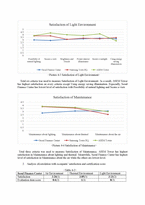친환경 건축물 인증(LEED) 이용자 만족도 분석 및 실내 환경 발전방향 고찰(영문)
 등록일 / 수정일
등록일 / 수정일 페이지 / 형식
페이지 / 형식 자료평가
자료평가 구매가격
구매가격
- 2018.06.25 / 2018.06.25
- 12페이지 /
 docx (MS워드 2007이상)
docx (MS워드 2007이상) - 평가한 분이 없습니다. (구매금액의 3%지급)
- 2,200원
최대 20페이지까지 미리보기 서비스를 제공합니다.
자료평가하면 구매금액의 3%지급!
 1
1 2
2 3
3 4
4 5
5 6
6 7
7 8
8 9
9 10
10 11
11 12
12
추천 연관자료
- 목차
-
Ⅰ. Introduction
1. Study background and objectives
2. Study scope and methodology
Ⅱ. Literature review
1. Environmentally friendly construction
1.1. Conceptions and Traits of Eco-friendly Construction
1.2. Current State
2. LEED certification
2.1. Concept of LEED
2.2. Types of LEED certification.
2.3. LEED grade classification
2.4 Detailed evaluation item of LEED
Ⅲ. Design of study
1. Research models and hypothesis setting
2. Data collection and analysis methods
Ⅳ. Data analysis
1. General characteristics of selected buildings
2. Comparing occupants’ satisfaction of LEED certified building and non-certified building
3. Analysis of correlation with occupants’ satisfaction and certification score
4. Analysis of satisfaction with LEED certified buildings and non-certified building
Ⅳ. Conclusion
References
- 본문내용
-
Ⅰ. Introduction
1. Study background and objectives
Recently, due to environmental pollution and climate change, attention to environment is more growing than ever. Especially, buildings form 40% of energy and resource consumption, 30-40% of carbon dioxide emission, 20-25% of waste discharge, 17% of water consumption, and 25% of wood consumption, so buildings are mainly responsible for energy consumption. In this situation, buildings in cities had been given environmental responsibility that can suggest 'new architectural alternative' in aspect of decreasing resource consumption and waste discharge. And in this process, the concept of green building appeared. One of these alternatives, green building certification was actively developed and carried out in each countries.
The United States established US Green Building Council (USGBC) in 1993 for pursuing the sustainability of buildings and construction industry, designed buildings and communities that can give environment improving quality of life and presented LEED (Leadership in Energy and Environmental Design) certification program considering environment and social in 2000. Besides, BREEAM in the United Kingdom, CASBEE in Japan etc. are made and practiced considering own countries. Accordingly, Korea have developed and practiced GBCC (Green Building Certification Criteria) from 2002, and 3330 buildings in Korea were acquired GBCC certification until Oct 2013. Also from 2009 to Oct 2013. 39 buildings in Korea were acquired LEED certification.
But, there are many problems of certification with the rate of attention and demand. First, certification can’t involve the process of use, because it is only given by the initial building design. So they have problem that can’t control environmental quality level change by utilizing of occupants. Also, they concentrate to physical factors for securement of environmental-friendly materials and skills and overlook the aspect of users in criteria. Like this, Green Building Certification have overlooked the users and process of using.
From these problems, this study will conduct investigation of occupants' satisfaction for studying focusing on users and indoor environment that greatly effect to users. Through this study, first, we will compare and analyze between LEED indoor environmental score of buildings and occupants' satisfaction, and research about the correlation between criteria and satisfaction. Second, we will compare and analyze between satisfaction of LEED buildings and non LEED building’s, and research effectiveness of LEED certification. As a result, we will suggest development to indoor environment of green office buildings for more human.
- 참고문헌
-
강신우, 2011, 「안산시 공공건축물의 친환경 건축기법 적용사례」, 석사학위 청구논문, 한양대학교, 서울
나민희, 2014, 「LEED인증 건축물 분석을 통한 실내공간 친환경 평가항목의 발전방향에 관한 연구 -국내 업무용 건축물 중심으로-」, 석사학위논문, 한성대학교 대학원, 서울
백홍철, 2010, 「국내 건축물의 LEED 인증을 위한 CM의 역할에 관한 연구」, 석사학위논문, 고려대학교 공과대학원, 서울
서혜수, 2004, 「사례분석을 통한 친환경건축물인증제도의 실내환경 인자 분석」, 석사학위 청구논문, 연세대학교, 서울
우강(于江), 2014, 「중국 녹색건축 인증제도 개선방안의 연구 -G-SEED(한) 및 LEED(미) 중심으로-」, 석사학위청구논문, 광운대학교 대학원, 서울
이원기, 2013, 「신축건축물 LEED 인증을 위한 추가 공사비 연구 -국내 LEED 인증 실 사례 중심으로-」, 석사학위논문, 서울과학기술대학교 주택대학원, 서울
한국 LEED 연구소, 『LEED, 미래의 건축』, 새로운 사람들, 2009
정지나 외 2명, 「국내 친환경 건축물 사례 분석」, 『그린빌딩(한국그린빌딩협의회지) 』, v.9 n.1
Jason Bae, 「친환경 인증제의 허점」, NEWS PAPERMINT, 2013년 8월 2일
미국 그린빌딩협의회. www.usgbc.org/
자료평가
-
아직 평가한 내용이 없습니다.
오늘 본 자료
더보기

최근 판매 자료
- [아동의 친사회적 행동] 친사회적 행동에 대한 정의(개념), 아동 친사회적 행동의 발달, 친사회적 행동에 영향을 미치는 요인
- [아동 생활지도와 상담] 기본 생활습관 형성의 의의와 지도 원리
- 가족상담및치료_가족 분석 보고서 가계도 작성법과 가계도 면접법을 바탕으로 자신의 가족 관계를 분석하시오
- 현재의 멀티미디어가 어디까지 발전했고, 앞으로 어떻게 발전할지에 대해 서술하시오
- [중국학] 문화대혁명 시기의 홍위병
- 학교사회복지 각각의 실천 모델에 대한 개념과 특징을 이해하고 이 중 하나의 실천 모델을 선정하여 개념과 특징을 설명하고 제시하시오.
- [A+]자기이해를 위한 나의 청소년기발달 과업의 특징(특성) 및 아동기발달의 특징(특성) 분석 보고서.구매평가 별 5개 만점
- 노인문제 사례분석 - 노년기의 자살
- [A+구매 만족] 종합심리검사 평가보고서 작성법(프로파일과 그래프사진 첨부,BGT,지능검사 K-WAIS,MMPI-2 척도 해석,로샤검사,TAT,문장완성검사 SCT 해석,HTP 검사 보고서)실제 심리평가 성인 사례 레포트 보고서
- [심리검사] 심리평가 보고서
저작권 관련 사항 정보 및 게시물 내용의 진실성에 대하여 레포트샵은 보증하지 아니하며, 해당 정보 및 게시물의 저작권과 기타 법적 책임은 자료 등록자에게 있습니다. 위 정보 및 게시물 내용의 불법적 이용, 무단 전재·배포는 금지됩니다. 저작권침해, 명예훼손 등 분쟁요소 발견시 고객센터에 신고해 주시기 바랍니다.









